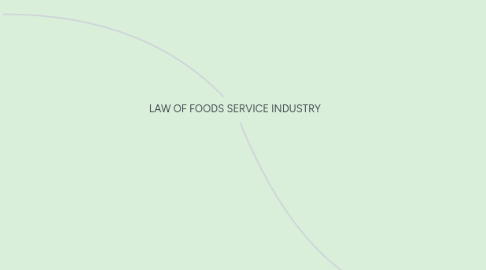
1. HALAL CERTIFICATION
1.1. Meaning of 'halal'
1.1.1. Means permissible or lawful according to Islamic law & can be consumed by a Muslim.
1.2. Conformity with Hukum Syarak
1.2.1. Halal food is food that does not consist of or contain any part of an animal that is haram or prohibited by Hukum Syarak.
1.3. Preparation, processing or storage also affect halal status
1.3.1. Halal food must not be poisonous or hazardous to health.
1.3.2. A food that is contaminated with impure substances (according to Hukum Syarak) during its preparation, processing or manufacture cannot be described as halal.
1.4. Scope of orders
1.4.1. Definition of Halal Order applies not only to food, but also to other goods, such as medicine & cosmetics
1.5. Halal certification
1.5.1. Food & goods that satisfy the criteria of halal of the Definition of Halal Order must still be certified as halal by the competent authorities
1.5.2. The Department of Islamic Development Malaysia (JAKIM) & the Islamic Council in the respective States (State islamic Department or JAIN) shall be the competent authorities to certify a food or goods as halal.
1.5.3. Halal certificates issued by other bodies will not be recognized
1.5.4. A manufacturer or seller that wishes to obtain halal certification should ensure that its operation/products comply with the criteria set out in the Halal Food: Production, Preparation, Handling and Storage-General Guidelines (MS 1500:2004)
1.6. Halal Logo
1.6.1. The manufacturer or seller of a food with halal certification is required to mark his product with the halal logo specified in the Forst Schedule of the Certification Order.
1.7. Halal certification and imported goods
1.7.1. The requirements of halal certification and marking of halal logo are also applicable to all imported food & goods marketed in Malaysia.
1.7.2. The food or goods concerned can be sold as halal products in Malaysia provided they are marked with the name/logo of the relevant foreign certification body.
1.7.3. JAKIM has issued Guidelines on the Appointment of Foreign Islamic Organisation as Halal Certification Body for Products to be Exported to Malaysia
1.7.4. The Guidelines set out the criteria & procedure for the grant of recognition to foreign halal certification bodies.
2. the enforcement of Food Act 1983
2.1. Authorized Officers
2.1.1. Appointment of authorized officers: The purpose of the Food Act is to protect the public against health hazards & fraud in the preparation, sale & use of food.
2.1.2. The Ministry of Health (MOH) is tasked with the job of enforcing the Food Act, and in this regard, the Minister can appoint 'authorized officers'(s 3(2)).
2.1.3. Power of authorized officer under s 4(1):
2.1.4. He can open & examine any package which he believes to contain any food to which the Food Act applies.
2.1.5. He can seize & detain any food or appliance
2.1.6. He can mark, seal or otherwise secure, weigh, count or measure any food or appliance.
2.2. Taking of sample
2.2.1. where sample can be divided into parts
2.2.1.1. The procedures for taking samples are set out in Part ||| (reg 4-8) of the Food Regulations 1985.
2.2.1.2. Suffice to state that, as a general rule, an authorised officer should divide the sample into 3 parts-1 part must be given to seller as record, 1 part must be sent for analysis, whereas the remaining part, he must retain.
2.2.2. where sample cannot be divided into parts
2.2.2.1. If it is not practical to divide the sample into 3 parts, or where dividing the sample would affect its composition & thereby affect analysis; the authorised officer should proceed slightly different
2.2.2.2. It is acknowledged that in some cases, it is not possible to divide the sample into parts or lots
2.3. Analysis to be carried out in 'Approved Laboratory'
2.3.1. The samples obtained by an authorised officer in the exercise of his powers under ss4 and 5 shall ve sent to 'approved laboratory'for analysis.
2.3.2. Section 3A of the Food Act empowers the Minister to approve such number of laboratories necessary for the enforcement activities under the Act.
2.3.3. The result is the setting up of various Food Quality Control Laboratories and Public Health Laboratories under the control of the MOH.
2.4. Power of the Director General to Obtain Particulars of Certain Food Ingredients
2.4.1. Under s 9(1), the Director General of Health ('Director General') may (with the written approval of the Minister), demand a person to provide him with particulars concerning the composition and use of any food or substance used in the preparation of food.
2.5. Hygiene and Sanitary Requirements
2.5.1. Upon inspection by an authorised officer, if a food premises is considered to have failed to comply with any hygiene or sanitary requirements specified in the Food Act or the food regulations; the Ministry may order that the food premises be put into a hygienic & sanitary condition
2.5.2. This requirement also applies to any appliance used for the preparation, preservation, packaging, storage, conveyance, distribution or sale of food.
2.6. Food handlers training
2.6.1. Under the Food Hygiene Regulation 2009, it is a requirement that all food handlers undergo a food handlers training in an institution specified by the Director (reg 30(1)).
2.6.2. Such approved institutions are usually food analysis companies that also provide food handlers training.

